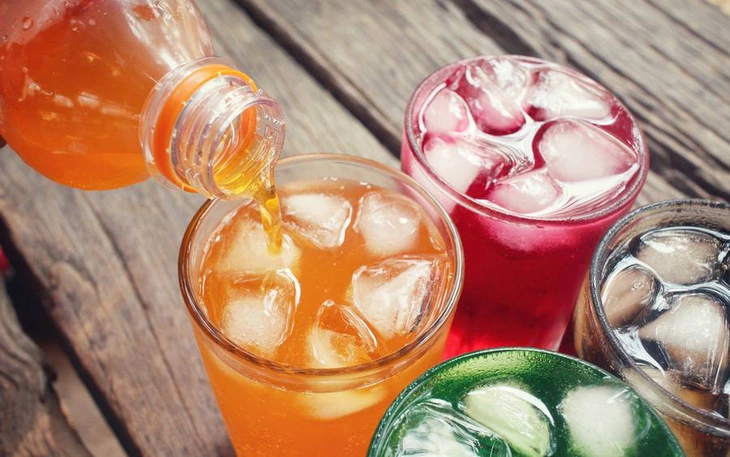
Sugary drinks are the cause of a series of diseases - Illustration photo
Sugary drinks and their health consequences
Sharing at a press conference on the harmful effects of sugary drinks on health and the role of excise tax in controlling diabetes recently organized by the Ministry of Health , Ms. Dinh Thi Thu Thuy - Deputy Director of the Legal Department, Ministry of Health - said that on average, 330ml of carbonated sugary drinks usually contain about 35g of sugar, providing about 140 kcal of energy, while having very little nutritional value (according to the World Health Organization).
A typical 455ml bottle of orange juice will contain about 15 teaspoons of sugar.
Research in 75 countries found that a 1% increase in sugary drink consumption was associated with nearly 5 more overweight adults per 100 people and more than 2 more obese adults per 100 people; mainly in low- and middle-income countries.
This study also identified that high consumption of sugary drinks in childhood is associated with an increased risk of overweight and obesity.
Regular use of sugary drinks increases the risk of metabolic disorders such as type 2 diabetes, cardiovascular disease, high blood pressure, gout, increases the risk of oral diseases, and adversely affects bone health.
"Regular consumption of sugary drinks is a major contributor to the global rise in obesity and diet-related non-communicable diseases. Overweight and obesity are a major health concern among both adults and children in Vietnam," said Ms. Thuy.
Dr. Angela Pratt, chief representative of the World Health Organization (WHO) in Vietnam, said that the rate of people with non-communicable diseases in Vietnam is high, and the rate of overweight and obesity is also increasing rapidly, from 15.6% in 2015 to 19.6% in 2021.
More worryingly, the rate of overweight and obesity in children and adolescents (5-19 years old) has more than doubled, from 8.5% in 2010 to 19% in 2020.
There is strong evidence that people who regularly consume sugary drinks face an increased risk of type 2 diabetes, heart disease, stroke and cancer. The habit has also been linked to weight gain and obesity in children and adults.
Consumption of sugary drinks in Vietnam has increased rapidly over the past 15 years. In 2023, Vietnamese people drank four times more sugary drinks than in 2009. In 2023, each person in Vietnam drank an average of nearly 70 liters of sugary drinks per year (1.3 liters/week).
Solutions to reduce sugary drink consumption
According to Dr. Hoang Thi My Hanh - Institute of Health Strategy and Policy, many countries around the world have implemented policies to reduce consumption of unhealthy foods, including sugary drinks.
"There are two main policy groups that create a favorable environment for consumers to choose and use healthier foods, such as imposing taxes on sugary drinks and subsidizing sugar-free/healthy drinks.
Nutrition labelling, sugar content/product and health warnings. Restricting advertising (especially to children) and promotions; restricting sugary drink sales areas; promoting healthy drinks in nutrition programmes.
The second policy group is behavior change communication including community-scale communication on healthy diet, including social marketing; nutrition education for target groups," said Ms. Hanh.
WHO recommends imposing taxes on sugary drinks to increase prices and reduce consumption. This measure is particularly effective in changing the habits of children and adolescents, who are more affected by price.
Globally, 104 countries/territories have enacted nationwide excise tax policies to increase the price of sugary drinks for health purposes. Three other countries have imposed excise taxes in some states/cities/provinces.
In the ASEAN region, there are 6 countries: Thailand, Philippines, Malaysia, Laos, Cambodia and Brunei that impose special consumption tax on sugary drinks.
Ms. Dinh Thi Thu Thuy also said that imposing taxes on sugary drinks and soft drinks is a measure that needs to be urgently implemented with the goal of protecting public health.
"The Ministry of Health agrees with the proposed plan to accept the draft Law on Special Consumption Tax as proposed by the Ministry of Finance, according to which the special consumption tax rate for this item can be extended in terms of application time and roadmap to 8% from 2027 and 10% from 2028," said Ms. Thuy.
Urgent need to impose special consumption tax on sugary drinks
Speaking to the press on May 7, Dr. Angela Pratt said that now is the right time to introduce a tax on sugary drinks. Without intervention, the trend of sugary drink consumption will continue to increase, leading to negative impacts on children, adolescents, adults, families, society and the economy.
“In some countries, we see industry wanting to block or delay the tax, arguing that it will cause economic loss.
But evidence from other countries suggests this is not the case. In fact, consumers are switching to other, healthier drinks. Smart manufacturers are adapting their products to meet new demands.
Therefore, WHO calls on policymakers to take action now," Dr. Angela Pratt emphasized.
Source: https://tuoitre.vn/lam-dung-do-uong-co-duong-la-con-duong-tat-dan-den-nhieu-loai-benh-20250507173257269.htm


































































































Comment (0)